常见词词形变化
八年级词形变化汇总
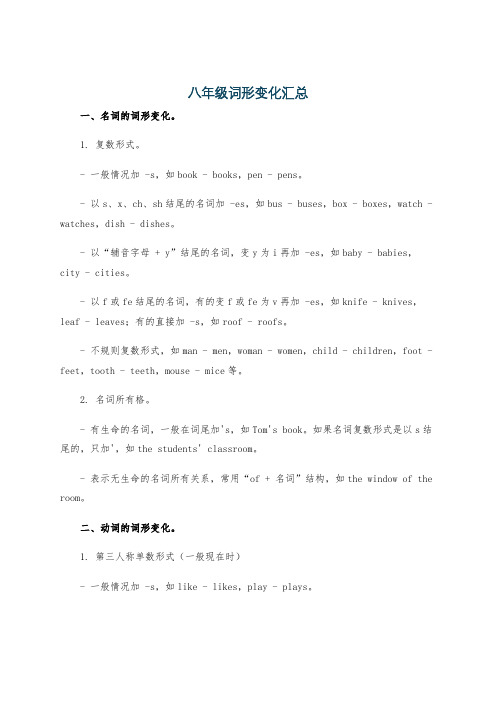
八年级词形变化汇总一、名词的词形变化。
1. 复数形式。
- 一般情况加 -s,如book - books,pen - pens。
- 以s、x、ch、sh结尾的名词加 -es,如bus - buses,box - boxes,watch - watches,dish - dishes。
- 以“辅音字母 + y”结尾的名词,变y为i再加 -es,如baby - babies,city - cities。
- 以f或fe结尾的名词,有的变f或fe为v再加 -es,如knife - knives,leaf - leaves;有的直接加 -s,如roof - roofs。
- 不规则复数形式,如man - men,woman - women,child - children,foot - feet,tooth - teeth,mouse - mice等。
2. 名词所有格。
- 有生命的名词,一般在词尾加's,如Tom's book。
如果名词复数形式是以s结尾的,只加',如the students' classroom。
- 表示无生命的名词所有关系,常用“of + 名词”结构,如the window of the room。
二、动词的词形变化。
1. 第三人称单数形式(一般现在时)- 一般情况加 -s,如like - likes,play - plays。
- 以s、x、ch、sh、o结尾的动词加 -es,如go - goes,do - does,watch - watches。
- 以“辅音字母 + y”结尾的动词,变y为i再加 -es,如study - studies。
2. 动词的 -ing形式(现在分词)- 一般情况加 -ing,如read - reading,write - writing。
- 以不发音的e结尾的动词,去e加 -ing,如make - making,take - taking。
词形变化的四种情况和举例

词形变化的四种情况和举例
词形变化是英语中一个不容忽视的重要语法内容,它主要包括增加词尾字母、双写末尾字母、去除末尾不发音的字母以及变换字母位置等四种情况。
首先,增加词尾字母一种情况,这是最常见的情况,主要发生在动词和形容词上。
比如,动词加-ed,表示现在分词和过去式,比如help----helped, love----loved; 而加-ing,表示现在分词help ----helping, love----loving; 对于形容词来说,加-er,-est表示比较级和最高级,比如 tall-taller-tallest, fat-fatter-fattest。
其次,双写末尾字母也是一种比较常见的情况,这种情况主要总现在表示动词的现在分词。
比如:run ---- running, begin----beginning。
第三,去除末尾不发音的字母也是一种比较常见的情况,这种情况主要发生在动词和名词上。
比如:run ---- ran,去除了末尾的“n”;school ----schol,去除了末尾的“l”。
最后,变换字母位置也是一种比较常见的情况,这种情况主要发生在动词和名词上。
比如:drink----drank, thumb----thumbe。
总而言之,词形变化是英语学习中不可或缺的重要语法内容,大家要仔细学习,理解各种变化规则,正确掌握词形变化,以便运用到英语学习和应用中。
初中英语常见词形变化表

初中英语常见词形变化表初中常见词形变化表able—unable Egypt--- Egyptian achieve----achievement engine—engineer act—actor—actress—active enter---entrance adjust---- adjustable Europe--- European advantage—disadvantage excite—excited—exciting agree—disagree fail---failure alone—lonely fair—unfair America—American familiar—unfamiliar annoy—annoyed—annoying final—finally Asia—Asian fly—flightathlete—athletic follow—following Australia—Australian foreign—foreigner balance—balanced forget—forgetful beauty---beautiful fortunate---fortunatelyFrance—French Brazil---Brazilianfriend—friendship bright—brightlybuild---building frustrate—frustrating—frustrated Canada—Canadian fur—furrycasual—casually Germany—German center---central golf—golferchange—exchange--chance Greece--- Greek chemistry—chemist gym--- gymnast china—Chinese head—headache choose—choice health—healthy—unhealthy clear---clearly honest—dishonest collect—collection—collector ill—illnesscommunicate—communication important—importance confident---confidence —unimportant courage—encourage include—including create---creative India—Indiancrowd---crowded interest—interested—interesting danger—dangerous interview—interviewer decide---decision invite—invitation describe---description Italy—Italian die---dead---death knowledge—knowledgeable difference—different—differently lead—leaderdisagree---disagreement live--alive disappoint—disappointed loud—loudly—aloud —disappointing love—lovingdonate—donation luck—lucky—luckily—unlucky easy—easily mean—meaning—means educate—education—educational memorize—memory—memorablemusic—musical—musician suggest—suggestion mystery—mysterious suit—suitable nation—national—international talent—talented nature—natural tired—tiring north—northern tooth—toothache organize—organization tour--tourist—touristy pain—tradition—traditionalpainfulpatient—patience train—training(un.) peace—peaceful translate—translator perform—performer—performance true—truly—truth person—personal usual—unusual—usually physics—physician violin—violinist piano—pianist wait—waiter—waitress play—player wake—awake pleasant—unpleasant west—western please—pleased—pleasant with—without polite—impolite—politely wonder—wonderful pollute—pollution—polluted worry—worried—worrying 《简爱》popular—popularity possible—possibly 是一本具有多年历叱癿文学着作。
古今词形变化很大的词汇

古今词形变化很大的词汇
一、走。
1. 古意。
- 词性:动词。
- 发音:zǒu(古音与现代音有一定差异,但大致为zǒu)。
2. 今意。
- 词性:动词。
- 发音:zǒu。
- 含义:表示人或鸟兽的脚交互向前移动,如“走路”“行走”。
二、去。
1. 古意。
- 词性:动词。
- 发音:qù(古音也接近qù,但声调等方面可能存在细微差别)。
2. 今意。
- 词性:动词,可作趋向动词(如“出去”),也可表示去除等动作(如“去皮”)。
- 发音:qù。
- 含义:有前往、到(某处),或者除掉、减掉等意思。
三、牺牲。
1. 古意。
- 词性:名词。
- 发音:xī shēng。
2. 今意。
- 词性:名词,也可活用作动词(如“牺牲自己”)。
- 发音:xī shēng。
- 含义:为了正义的目的舍弃自己的生命,或放弃、损害一方的利益。
四、妻子。
1. 古意。
- 词性:名词。
- 发音:qī zǐ。
2. 今意。
- 词性:名词。
- 发音:qī zǐ。
- 含义:男子的配偶。
高考英语常用数词词形变化归纳

高考英语常用数词词形变化归纳本文将归纳高考英语中常用的数词的词形变化,以帮助考生更好地掌握这些知识点。
一、基数词和序数词基数词表示数量或顺序,序数词表示顺序。
1. 基数词变为序数词的规则如下:- 如果基数词以辅音字母加y结尾,将y改为i,再加-th。
例如:twenty → twentieth- 如果基数词以辅音字母加e结尾,直接加-th。
例如:twelve→ twelfth- 如果基数词以辅音字母加o结尾,直接加-th。
例如:forty → fortieth- 其他情况下,直接加-th。
例如:seven → seventh2. 序数词变为基数词的规则如下:- 如果序数词以-th结尾,去掉-th后,加上ty或ty后再加y。
例如:thirteenth → thirteen- 如果序数词以-gth结尾,去掉-gth后,加上tieth。
例如:eighth → eightieth- 如果序数词以-ty结尾,去掉ty后,加上ty或ty后再加y。
例如:twenty-first → twenty one二、数字和数位的表达1. 数字和数位的表达如下:- 千:thousand- 百万:million- 十亿:billion- 万亿:trillion2. 表达小数时,小数点用点表示,小数部分为数字。
例如:3.14 → three point one four3. 表达分数时,用基数词表示分子,序数词加-th表示分母。
例如:1/4 → one fourth三、其他数词表达1. 所有基数词和序数词后都可以加上-teen表示十几。
例如:seventeen → seventeen2. 个位数的基数词和序数词通常是不同的。
例如:one → first以上是高考英语中常用的数词词形变化归纳,希望对考生有所帮助。
常 用 单 词 词 形 变 化 归 纳

常用单词词形变化归纳一.名词(一) -ment1. employ v. 雇用→employment n. 工作,职业2. treat v. 治疗;对待→treatment n. 治疗3. entertain vt. 使愉快→entertainment n. 娱乐;款待→entertaining adj. 有趣的,令人愉快的4. govern vt. 统治,治理→government n. 政府→24.argue vi. 争论→argument n. 争论(二) -tion●1. instruct vt. 指示,指导→instruction n. 指示,说明2. correct vt. 改正adj. 正确的→correction n. 改正,纠正3. react vi. 反应→reaction n. 反应4. attract vt. 吸引→attraction n. 吸引→attractive adj. 吸引人的5. construct vt. 建造,建设→construction n. 建造,建设,建筑6. protect vt. 保护→protection n. 保护7. invent vt. 发明→invention n. 发明8. addict n. (对药物等)上瘾的人→addiction n. 瘾;入迷;嗜好→addicted adj. 有瘾的;上瘾的9. connect v. 连接;联系→connection n. 联系,关系,关联10. direct vt. 指挥 adj. 直接的;径直的→direction n. 方向→director n. 指挥11. predict vt. 预言,预料→prediction n. 预测16.17.●→13. hesitate v. 犹豫,迟疑→hesitation n. 犹豫14. appreciate vt. 感激;欣赏→appreciation n. 感激;欣赏15. create vt. 创造,发明→creation n. 创造力→creative adj. 创造性的16. concentrate vi. 集中(注意力、思想等)→concentration n. 专心,专注,注意17. participate v. 参加,参与→participation n. 参加,参与→participant n. 参与者,参加者18. communicate vi. (用语言、信号)传递信息;交流→communication n. 交流,沟通19. celebrate vt. 庆祝→celebration n. 庆祝;庆典20. accommodate vt. 容纳(乘客等)→accommodation n. 住处;住宿,膳食21. immigrate v. 移民,移居→immigration n. 移居→immigrant n. 移民,侨民22. migrate v. 迁移,迁徏;移居→migration n. 迁移,迁徏;移居→migrant n. 候鸟;移居者23. desperate adj. 绝望的→desperation n. 绝望despair n. 绝望●1. adapt vi. 适应;适合→adaptation n. 适应→adaptable adj. 适应性强的→口译员7.12.的20. preserve v. 保护;保存→preservation n. 保存;贮藏21. register vt. 记录;登记→registration n. 执照;登记22. qualify vt. & vi. (使)有资格→qualification n. 合格;资格→qualified adj. 合格的,称职的23. occupy v. 占领→occupation n. 职业→occupied adj. 被占领的,忙于24. apply v. 申请;应用→application n. 申请;应用●1. contribute vt. 贡献→contribution n. 贡献2. distribute v. 分发,分配,分送→distribution n. 分发,分配3. exhibit vt. 展览→exhibition n. 展览4. recognise vt.认出;认识到;承认→recognition n. 认出;承认5. oppose vt. 反对→opposition n. 反对→opposite prep.在……对面 adj. 相对的;对面的;6. compose vt. 作曲;创作→composition n. 作文;作曲7. compete vi. 竞争→competition n. 竞赛,比赛→competitor n. 竞争者→competitive adj. 竞争的性的(三)(四)●1. intelligent adj. 聪明的→intelligence n. 智力2. patient adj. 耐心的 n. 病人→patience n. 耐心3. silent adj. 安静的;沉默的,不说话的→silence n. 安静;沉默,不说话4. different adj. 不同的→difference n. 差异,区别5. independent adj. 独立的→independence n. 独立6. violent adj. 猛烈的,激烈的,强烈的→violence n. 暴力→violently adv. 猛烈地,激烈地7. convenient adj. 方便的→convenience n. 方便;便利→inconvenience n. 不便;麻烦8. confident adj. 自信的→confidence n. 信心→confidently adv. 自信地9. absent adj. 缺席的,不在场的;缺乏的→absence n. 缺乏,不存在10. present adj. 出席的,在场的→presence n. 出席,在场11. distant adj. 遥远的→distance n. 距离12. important adj. 重要的→importance n. 重要性●(五)5. equal adj. 平等的vt. 等于;比得上n. 同等的人或物→equality n. 平等→equally adv. 平等地6. similar adj. 同样的,类似的→similarity n. 相似,类似7. major adj. 主要的;多数的→majority n. 大多数8. minor adj. 较小的,少数的→minority n. 少数民族;极少数9. generous adj. 慷慨的,大方的→generosity n. 慷慨,大方10. curious adj. 好奇的→curiosity n. 好奇心→curiously adv. 好奇地11. active adj. 积极的,活跃的→activity n. 活动12. diverse adj. 完全不同的;各不相同的→diversity n. 多样性13. secure adj. 安全的→security n. 安全14. possible adj. 可能的→possibility n. 可能;可能性→possibly adv. 可能地15. able adj. 有能力的→ability n. 能力→disable vt. 使伤残→disabled adj. 残疾的→disability n. 失去能力;伤残16. responsible adj. 尽责的;负有责任的→responsibility n. 责任17. anxious adj. 焦虑的,不安的→anxiety n. 焦虑;不安(六)→(七)→7. train vt. 训练→training n. 训练,培训(八) -th1. strong adj. 坚强的;强壮的→strength n. 力量;力气2. warm adj. 温暖的→warmth n. 温暖;热情3. deep adj. 深的→depth n. 深度;深处4. long adj. 长的→length n. 长度5. true adj. 真的,真实的→truth n. 真相6. young adj. 年轻的→youth n. 年轻;青年时期7. grow v. 生长,成长→growth n. 生长;增长(九)其它1. fail v. 失败→failure失败2. press v. 按下,压下→pressure n. 压力3. mix vt. & vi. (使)混合→mixture n. 混合物4. furnish v. 为(房屋或房间)配备家具→furniture n. 家具5. sign vt. 签署→signature n. 签名26. compare vt. 比较→comparison n. 比较;比喻27. expose v. 使暴露→exposure n. 暴露;显露28. champion n. 冠军→championship n. 冠军地位;锦标赛29. affect vt. 影响→effect n. 影响,效果→affection n. 爱,慈爱;情感30. apologize vi. 道歉→apology n. 道歉31. choose v. 选择→choice n. 选择32. contain vt. 包含→container n. 容器→content n. 内容33. laugh vi. 笑→laughter n. 笑,笑声34. proud adj. 骄傲的→pride n. 骄傲35. think v. 想;认为→thought n. 想法36. weigh v. 称重;重量是→weight n.重量(十)具有不同形式和词义的名词1. architecture n. 建筑学→architect n. 建筑师2. art n. 艺术;美术→artist n. 画家3. crime n. 罪行;犯罪行为→criminal n. 罪犯4. dance n. & v.舞蹈→dancer n.舞蹈者,舞蹈家13. centre / center n. 中心→central adj.中央的,中心的;重要的,核心的14. economy n. 经济→economical adj. 经济的;节约的→economist n. 经济学家15. politics n. 政治→political adj. 政治的→politician n. 政治家16. history n. 历史→historical adj. 历史性的→historic adj. 有历史意义的17. geography n. 地理→geographical adj. 地理的18. intellect n. 智力;思维→intellectual adj. 脑力的;思维的;需用才智的19. finance n. 财政,金融→financial adj. 财政的,金融的20. face n. 脸→facial adj. 脸部的,面部的21. race n. 种族→racial adj. 种族的22. society n. 社会;社团;交往→social adj. 社会的23. influence vt. & n. 影响→influential adj. 有影响的24. benefit n. 好处,利益→beneficial adj. 有益的,有用的25. industry n. 工业→industrial adj. 工业的(三)-ful1. colour n. 颜色→colourful adj. 彩色的2. thank n. &vt. 感谢→thankful adv. 感激的→thankfully adv. 感激地后悔地,遗憾地11. adj. (充满)(四)8. mud n. 泥,泥浆→muddy adj. 泥泞的9. salt n. 盐→salty adj. 含盐的,咸的10. health n. 健康→healthy adj. (反义词)健康的11. wealth n. 财富;财产→wealthy adj. 富裕的;有钱的12. luck n. 运气;好运→lucky adj. 幸运的→luckily adv. 幸运地;幸亏13. risk n. 危险 vt. 使遭受危险;冒险→risky adj. 危险的;冒险的14. mood n. 心情;心境→moody adj. 喜怒无常的15. hill n. 小山→hilly adj. 多山的;丘陵起伏的16. hunger n. 饥饿→hungry adj. 饥饿的17. taste n. 味道 v. 品尝;尝起来有……味道→tasty adj. 美味可口的(五)-ed1. balance n. 天平;平衡→balanced adj. 平衡的2. talent n. 天分,天赋,才华→talented adj. 有才能的3. abandon v. 放弃,抛弃→abandoned adj. 被放弃的,被遗弃的4. crowd n. 人群 vt. 聚拢→crowded adj. 拥挤的(六)(七)(八)4. remark vi. & vt. 说起;评论 n. 评论;讲话→remarkable adj. 显着的,非凡的5. value n. 价值→valuable adj. 宝贵的,珍贵的6. reason n. 原因,理由→reasonable adj. 合理的;讲道理的(九)-ly1. day n. 天,日子→daily adj. 每天的2. week n. 周,星期→weekly adj. 每周的3. month n. 月→monthly adj. 每月的4. year n. 年→yearly adj. 每年的5. friend n. 朋友→friendly adj. 友好的6. love n. 爱→lovely adj. 可爱的7. order n. 秩序→orderly adj. 有条理的8. lively adj. 生动的,活泼的9. likely adj. 可能的10. lonely adj. 孤单的,寂寞的→alone adj. 单独的,独自的 adv. 单独地,独自地(十)-en13. responsible adj. 负责任的;负有责任的→irresponsible adj. 不负责任的,不可靠的14. legal adj. 法律的;合法的→illegal adj. 违法的;非法的(十二)其它1. freeze vt. 冷冻→freezing adj. 冷冰冰的;极冷的→frozen adj. 结冰的;冻结的2. surround vt. 围绕;环绕→surrounding adj. 周围的→surroundings n. 周围环境3. refresh v. 使恢复精力;使凉爽→refreshing adj. 令人耳目一新的4. remain v. 仍然,有待→remaining adj. 剩余的→remains n. 遗迹;遗体5. favour n. 恩惠;善意的行为→favourite adj. 特别受喜爱的6. evidence n. 证据→evident adj. 显然的,明显的三.副词fortunate→fortunately immediate→immediately safe→safelywide→widely polite→politely complete→completelyentire→entirely rare→rarely close→closelyextreme→extremely strange→strangely large→largelyrelative→relatively effective→effectively sure→surelybrave→definitepossible(一(二)2. class n. 等级,类别→classify vt. 将……分类3. simple adj. 简单的→simplify vt. 简化单词词形变化拼写规则总结一.名词的复数,动词的一般现在时第三人称单数1. 直接加-s。
各类词形的变化方式
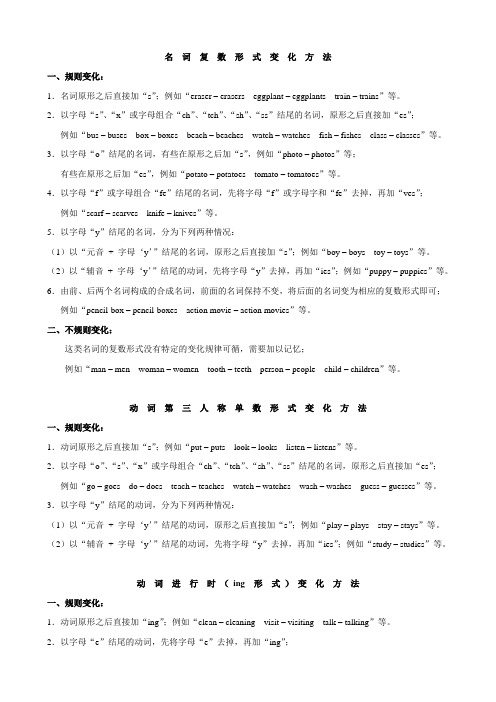
名词复数形式变化方法一、规则变化:1.名词原形之后直接加“s”;例如“eraser – erasers eggplant – eggplants train – trains”等。
2.以字母“s”、“x”或字母组合“ch”、“tch”、“sh”、“ss”结尾的名词,原形之后直接加“es”;例如“bus – buses box – boxes beach – beaches watch – watches fish – fishes class – classes”等。
3.以字母“o”结尾的名词,有些在原形之后加“s”,例如“photo – photos”等;有些在原形之后加“es”,例如“potato – potatoes tomato – tomatoes”等。
4.以字母“f”或字母组合“fe”结尾的名词,先将字母“f”或字母字和“fe”去掉,再加“ves”;例如“scarf – scarves knife – knives”等。
5.以字母“y”结尾的名词,分为下列两种情况:(1)以“元音+ 字母‘y’”结尾的名词,原形之后直接加“s”;例如“boy – boys toy – toys”等。
(2)以“辅音+ 字母‘y’”结尾的动词,先将字母“y”去掉,再加“ies”;例如“puppy – puppies”等。
6.由前、后两个名词构成的合成名词,前面的名词保持不变,将后面的名词变为相应的复数形式即可;例如“pencil-box – pencil-boxes action movie – action movies”等。
二、不规则变化:这类名词的复数形式没有特定的变化规律可循,需要加以记忆;例如“man – men woman – women tooth – teeth person – people child – children”等。
动词第三人称单数形式变化方法一、规则变化:1.动词原形之后直接加“s”;例如“put – puts look – looks listen – listens”等。
词形变换
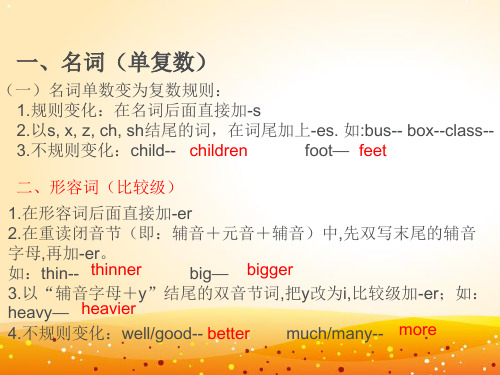
(一)名词单数变为复数规则: 1.规则变化:在名词后面直接加-s 2.以s, x, z, ch, sh结尾的词,在词尾加上-es. 如:bus-- box--class-3.不规则变化:child-- children foot— feet 二、形容词(比较级) 1.在形容词后面直接加-er 2.在重读闭音节(即:辅音+元音+辅音)中,先双写末尾的辅音 字母,再加-er。 如:thin-- thinner big— bigger 3.以“辅音字母+y”结尾的双音节词,把y改为i,比较级加-er;如: heavy— heavier 4.不规则变化:well/good-- better much/many-- more
longer-- shorter bigger-- smaller stronger— thi
(1)gift(复数)______ clean(过去式)______ small(比较级)______ grow(第三单)______ shorter(反义词)______
三、动词
(一)动词过去式:
1.动词词尾直接加 -ed , 如: clean-stay-watch-fix-lick-laugh— 2.以不发音的 -e 结尾动词,动词词尾加 -d,如:like-3.以辅音字母 + y结尾的动词,把-y变为-i 再加-ed,如:worry-4.以重读闭音节结尾,后面只有一个辅音字母,双写再加ed,如 5.不规则变化: have- had sleep-- slept read-- read see- saw drink-- drank go-- went ride-- rode hurt-- hurt eat-- ate take-- took buy— bought fall-- fell can-- could feel-- felt wake-- woke think-- thought am\is— was are-- were give-- gave run-- ran sit-- sat make-- mad do— did get-- got sleep— slept e
中考英语词形变化汇总

中考词形变化汇总一、名词—形容词health—healthyluck—luckysalt—saltysleep—sleepycloud—cloudyrain—rainysnow—snowywind—windyfog—foggysun—sunnyfun—funnynoise—noisyshine—shinytaste—tastyfriend—friendlylove—lovelyweek—weeklygold—goldenwood—woodenwool—woolenwest—westerneast—easternnorth—northernsouth—southerneducation—educationaltradition—traditionalmusic—musicalperson—personalculture—culturalnature—natural practice—practical medicine—medical physics—physical danger—dangerous humor—humorous beauty—beautiful cheer—cheerful delight—delightful peace—peaceful power—powerful success—successful wonder—wonderful end—endless home—homeless noise—noiseless care—careful—careless cheer—cheerful—cheerless color—colorful—colorless harm—harmful—harmless help—helpful—helpless hope—hopeful—hopeless meaning—meaningful—meaningless use—useful—useless fashion—fashionable value—valuable energy—energetic fool—foolish America—American Britain—British England—English China—Chinese Japan—JapaneseFrance—French二、动词—形容词amaze—amazed—amazingbore—bored—boringdisturb—disturbed—disturbingexcite—excited—excitingfrighten—frightened—frighteninginterest—interested—interestingrelax—relaxed—relaxingsurprise—surprised—surprisingsatisfy—satisfied—satisfyingtire—tired—tiringworry—worried—worryingscare—scaredstress—stressed—stressfulorganize—organizeddie—deadlive—alive —livingsleep—asleep—sleeplesswake—awakeact—activecreate—creativecome—comingfollow—followingsmile—smiling三、形容词—副词polite—politelysure—surelysafe—safelywide—widelytrue—truly comfortable—comfortably gentle—gently simple—simply terrible—terribly possible—possibly probable—probably angry—angrily busy—busily easy—easily happy—happily heavy—heavily healthy—healthily lucky—luckily noisy—noisily unlucky—unluckily bright—brightly calm—calmly clear—clearly correct—correctly deep—deeply different—differently excited—excitedly final—finally free—freely loud—loudly neat—neatly pleasant—pleasantly quiet—quietly quick—quickly real—really recent—recently regular—regularly sad—sadly slow—slowlysoft—softlysudden—suddenlyusual—usuallybeautiful—beautifullycareful—carefullycareless—carelesslypeaceful—peacefullysuccessful—successfullywonderful—wonderfully四、动词—名词call—callerclimb—climberdance—dancerdesign—designerdrive—driverhunt—hunterlead—leaderown—ownerorganize—organizerperform—performerplay—playerprint—printerproduce—producerread—readerreport—reporterrecord—recordersing—singerspeak—speakertravel—traveller/travelerwait—waiter—waitresswork—workerwrite—writer swim—swimmer shop—shopperrun—runnerrob—robberrub—rubberwin—winner act—actor—actress collect—collector—collection visit—visitor invent—inventor—invention direct—director—direction educate—educator—education operate—operator—operation protect—protection suggest—suggestion celebrate—celebration communicate—communication congratulate—congratulation donate—donation pollute—pollution invite—invitation organize—organization introduce—introduction achieve—achievement advertise—advertisement arrange—arrangement excite—excitement improve—improvement agree—agreement develop—development achieve—achievement move—movement punish—punishment treat—treatmentbreathe—breathdie —death grow—growth arrive—arrival choose—choice decide—decision enter—entrance marry—marriage perform—performance rob—robbery serve—service think—thought weigh—weight hike—hiking begin—beginning jog—jogging swim—swimming skate—skating shake—shaking write—writing ski—skiing walk—walking end—ending build—building cook—cooking cross—crossing turn—turning hear—hearing meet—meeting draw—drawing paint—painting train—training warn—warning spell—spellingread—reading五、名词—名词(表示人)art—artisttour—touristscience—scientistpiano—pianistviolin—violist/violinistmusic—musician六、形容词—名词kind—kindnessill—illnesssick—sicknessrich—richnesssad—sadnesscareful—carefulnesscareless—carelessnessugly—uglinesshappy—happinessunhappy—unhappinessdifferent—differencepatient—patienceconfident—confidencedifficult—difficultysafe—safetyable—abilitywise—wisdomhigh—heightdeep—depthwide—widthlong—lengthstrong—strengthwarm—warmthtrue—truthyoung—youth七、加前缀un-,im-,in-,ir-,dis-变反义词able—unablecomfortable—uncomfortablecommon—uncommonfriendly—unfriendlyfair—unfairgrateful—ungratefulhappy—unhappyhealthy—unhealthyhelpful—unhelpfulimportant—unimportantkind—unkindlike—unlikelucky—unluckyluckily—unluckilynecessary—unnecessarypleasant—unpleasantpopular—unpopularusual—unusualwelcome—unwelcomepatient—impatientpossible—impossiblepolite—impolitecorrect—incorrectregular—irregularappear—disappearcover—discoverhonest—dishonestlike—dislike八、需双写最后一个字母变现在分词的动词begin—beginningchat—chattingclap—clappingcut—cuttingdrop—droppingplan—planningrun—runningsit—sittingshop—shoppingstop—stoppingswim—swimmingwin—winning九、双写最后一个字母再加-er/-est变比较级/最高级的形容词和副词wet—wetter—wettestmad—madder—maddestsad—sadder—saddesthot—hotter—hottestslim—slimmer—slimmestthin—thinner—thinnestfat—fatter—fattestbig—bigger—biggest十、不规则形容词/副词的比较级、最高级good—better—bestlittle—less—leastfar—farther/further—farthest/furthestbad/badly/ill—worse—worstmany/much—more—most十一、复数变化不规则的名词foot—feettooth—teethmouse—micechild—childrenman—menwoman—womenfireman—firemenpoliceman—policemenpostman—postmensalesman—salesmensheep—sheepfish—fish/fishesChinese—ChineseJapanese—Japanese十二、不规则动词(一)AAA型(原形→原形→原形) 原形过去式过去分词中文cut cut cut 切,割cost cost cost 花费hit hit hit 撞,击hurt hurt hurt 伤害let let let 让put put put 放read read read 读set set set 安排原形过去式过去分词中文becomebecamebecome 成为come came come 来run ran run 跑1.原形→ew→own原形过去式过去分词中文blow blew blown 吹fly flew flown 飞grow grew grown 生长know knew known 知道原形过去式过去分词中文begin began begun 开始drink drank drunk 喝ring rang rung 打电话sing sang sung 唱swim swam swum 游泳原形过去式过去分词中文choose chose chosen 选择freeze froze frozen 冻speak spoke spoken 说原形过去式过去分词中文eat ate eaten 吃fall fell fallen 吃下1.原形→ought→ought。
各种词形变化

一.名词变复数1.一般情况在词尾加s map maps, sea seas, girl girls, day days2.以x,s,ch,sh 结尾的名词后加es class classes, box boxes,watch watches, dish dishes3. 以f或fe结尾的词变f和fe为ves leaf leaves, knife knives, wife wives加s belief beliefs, chief chiefs, proof proofs, roof roofs, gulf gulfs4.以辅音字母加y结尾的名词,变y为i加es party parties, family families, story stories5.以元音字母加y结尾的名词,加s toy toys, boy boys, day days, ray rays6.以辅音字母加o结尾的名词加es hero--heroes, potato--potatoes, tomato--tomatoes一些外来词,音译词加s piano---pianos,photo--photos,kilo--kilos,vedio--vedios 7以元音字母加o结尾的名词s radio---radios,bamboo---bamboos, zoo---zoos表示哪国人1.加s Americans, Australians, Germans, Greeks, Swedes, Europeans2.单复数同形Swiss瑞士人, Chinese, Japanese3.以man或woman结尾的改为men,women Englishmen, Frenchwomen合成名词1. 将主体名词变为复数son s–in-- law, looker s---on, passer s---by, storyteller s,2. 无主体名词时将最后一部分变为复数grown--ups,house--wives,3. 将两部分变为复数women singers, men servants通常作不可数名词的词information信息;advice忠告,建议;progress进步,进展;weather天气;fun乐趣,快乐;equipment设备;furniture家具;wealth财富;damage损坏;traffic交通,车辆及行人;baggage/luggage行李;work工作;homework家庭作业;housework家务;luck运气;cake蛋糕,news 新闻二.形容词变副词1.直接+ly free---freely; 注意:full---fully2. 以—le 结尾的形容词去e + yterrible —terribly ;possible—possibly ; comfortable--comfortably3.其它以e结尾的形容词直接+ly fortunate—fortunately;immediate—immediately注意:true—truly whole—wholy4.以辅音+y结尾的,去y 为i+ly happy—happily ;easy—easily ;angry—angrily注意:dry—dryly shy—shyly4. 以ic结尾的+ally energetic—energetically automatic—automatically scientific—scientifically basic—basically注意:public— publicly三.形容词,副词的比较级,最高级1 一般在形容词、副词后加上er表示比较级加上est表示最高级2 以不发音的e结尾的,只加上r表示比较级,加上st表示最高级。
什么是词形变化举例说明

什么是词形变化举例说明词形变化是词汇的一种形态变化方式,通常涉及词的词根、词缀、词尾等部分的改变。
它可以用来形成不同的词形,从而表达不同的意思或者语法功能。
下面将通过几个例子来说明词形变化的概念和实际应用。
1. 动词的词形变化:动词是一个常见的词类,它们经常发生词形变化。
举个例子,考虑动词 "run"(跑),当我们将其变为过去时态,它的词形就发生了变化,变成了 "ran"(跑过)。
在这个例子中,词形变化通过改变词尾来表示过去时态。
2. 形容词的词形变化:形容词也常常发生词形变化,以表达不同的程度或者比较级。
例如,考虑形容词 "big"(大)。
当我们想表达比较级时,需要将其词形变为 "bigger"(更大)。
同样地,如果我们想表达最高级,则需要将其词形变为"biggest"(最大)。
3. 名词的词形变化:名词也能发生词形变化,以表示不同的数的形式。
比如,将名词"child"(孩子)变为复数形式时,我们将其词形变为"children"(孩子们)。
在这个例子中,我们通过改变词尾来表示复数形式。
4. 副词的词形变化:副词也会发生词形变化,以表达不同的方式或程度。
举个例子,考虑副词 "quickly"(迅速地)。
当我们想表达其比较级时,需要将其词形变为 "quicker"(更快地)。
同样地,如果我们想表达最高级,则需要将其词形变为 "quickest"(最快地)。
通过以上几个例子,我们可以看到词形变化在语言中的重要性和实际应用。
它允许我们通过改变词的形态来传达不同的意思、语法功能或者表达方式。
词形变化是语言多样性的体现,也是我们愈发丰富表达的方式之一。
常见词汇词性转换

常见词汇词性转换动词变名词常见词形变化1. v+ ment 结尾achieve---achievement 成就advertise---advertisement// advertising agree — agreement appoint---------- a ppointmentdisappoint --- disappointment disagree --- disagreement 2 . V+ tion/sion 结尾admit — admission 承认attract — attraction有吸引力的事或人;conclude — conclusion 结论compete — competition 竞争,比赛consider--- consideration discuss —discussion 讨论decide--- decision describe — description 描写,描绘direct---direction determine--- determination educate educationexplain --- explanation express --- expression graduate —— graduation hesitate--- hesitation invite —— invitation imagine imagination 想象力introduce —introduction 介绍instruct — instruction指导,介绍3. V+ ance /ence 结尾allow — allowance 允许appear — appearance 夕卜貌,出现disappear---disappearance 消失4. V+ ing 结尾bathe洗澡--- bathing end 结束ending 结尾,结局train 训练---training 5 . V+ 其他able--- illustrate --illustration inspire---inspiration 灵感,鼓舞人的impress — impressionoperate — operationorganize --- organizationpermit---permissionpollute --- pollutionpredict---predictionprepare---preparation pronounce -- pronunciation resolve resolution 决心suggest --suggestionsolve --- solutionsatisfy --- satisfaction perform ---- performance --performerexist — existence 存在mean --- meaning 意义say —— saying 谚语believe — belief 信仰behave ---- behaviordie---dead --- deathemploy-employer 雇主--employee 雇贝ability---disable assist assisitantanalyze---analysis arrive-- arrival 至ij 达beg (乞讨)一beggar 乞丐amuse --- amusement 娱乐argue---argument 争吵commit —— commitment 奉献develop--- development equip ---equipment 装备, 器材govern统治一government政府manage---management 经营管理invent — inventor / inventionknow---knowledgefly --- flightfail -- failuregrow ----growthmix混含 -- mixture 混含物marry ——marriagepress 按,压一pressure 压力propose — proposal 建议 receive — receptionist 接待员serve ——service 月艮务succeed-- success——successful survive ——survival-survivor 幸存者tour tourist 游客withdraw withdrawal 取钱;收回;撤退动词/名词变形容词anger 生气--angry adjust--adjustable 可调整的bala nee -bala need 平衡的benefit------------ b eneficialbusy ---businesseloud---eloudyelass — elassieal 经典的erow---erowded 拥挤的eare — eareful/ eareless小心的;粗心的eolor---eolorfuleomfort -- eomfortableeourage — eourageous 勇敢的eonfidenee -- eonfidentdanger — dangerousdiffieult --- diffieultydifferenee---differentdependenee —dependent independenee--independent edueation- --edueational 有教育意义的energy--- energetiefashion -- fashionablefog — foggy有雾的fur --- furry 毛皮的friend — friendly free — freedom guilt 罪恶---guilty内疚的health---healthy---unhealthy help h elpful---helpless history --- historieal high --- heightho n est — ho n esty 诚实的home —homeless hunger---hungry ill --- illness important---importanee knowledge--- knowledgeable luek---lueky long —length medieine 药medieal 医学的mean---meaning --- meaningful mystery --- mysterious 神秘的musie---musieian -- musieal nature---natural 白然的nation — national 国家的noise---noisy origin 起源---original新颖的;独创的please -- pleasure---pleasant / pleased peaee peaeeful pain --- painfulpatient --- patienee/ impatienee person -- personalpopu l ar --- popu l arity 流彳亍性possible---possibility---impossiblerain---rainy responsible —responsibility salt --- salty safe---safety sad sadness society ----- socialscience ---- scientificsnow---snowy sun — sunny shine---shiny silk — silky sleep---sleepy /asleep suit--- suitable strong-------- strength thank ---- thankful taste ---- tasty 好吃的true---truth tradition------------- traditionaltalent ---- talented 有天赋的use---useful-useless urgent —urgency 紧急value valuable wonder---wonderful wind —windy wood — wooden 木制的wool — woolen羊毛的wide ——width动词变ing/ed的形容词amaze---amazing---amazed bore---boring boredconfuse --- confusing--- confuseddisappoint--- disappointing-- disappointed excite--- exciting excited embarrass--- embarrassing--- embarrassed frighten frightening frightened frustrate -- frustrating--- frustratedinterest--- interesting interested puzzle puzzling puzzledrelax --- relaxing ---- relaxedsatisfy ---- satisfying ---- satisfiedsurprise--- surprising --- surprisedtire — tiring ---tired形容词变副词1.形容词直接+ ly actual---actually bad — badly bright —brightly casual — casually 随意地clear — clearly complete —completely 完全correct--- correctly 正确地final--finally fortunate ——fortunately firm--- firmly general — generally immediate- --immediately loud — loudly late 迟的一lately最近;近来main ----------- mainlymost mostlynormal---normally particular —particularly polite —politely proper ---properlyquick — quicklyquiet — quietly 轻轻地,安静地real —reallyrecent ---recently sad--sadlyslow---slowly2. 以le 结尾的夫e + y comfortable--- comfortably gentle ——gently possible--- possibly3. 辅音字母+ y 变ily easy — easily heavy — heavily happy--happily4. 特殊good — well好地special — specially 专门,特殊地specific---specifically 特定地,明确地名词---形容词一副词beauty 美,美人一beautiful —beautifully care — careful — carefully care — careless —c arelessly difference---different---differently fortune —fortunate — fortunately/unfo rtunately happiness —happy —happily hunger —hungry--hungrily health —healthy —healthily luck —lucky —luckily noise —noisy —noisily方位的词名词一形容词East — eastern West — westernSouth ——southernstrong — strongly 坚决地,损烈地sudden — suddenly 突然usual —usually probable---probablysimple --- simply 仅仅;只;简单地terrible---terribly四大洲名词----形容词pride — proud — proudly 骄傲地sadness — sad — sadly safety 安全;安全的地方一safe — safely silence —silent---silently 默默地success —successful — successfully truth — true —truly unluck — unlucky 一unluckilywonder 奇迹一wonderful—wonderfullyNorth---northernIn the west of ChinaIn the western part of Chinatrue — trulyAsia 亚洲I- ----- A sian Africa 非洲---- African Europe 欧洲-European America 美洲---------- American。
英语词形转换
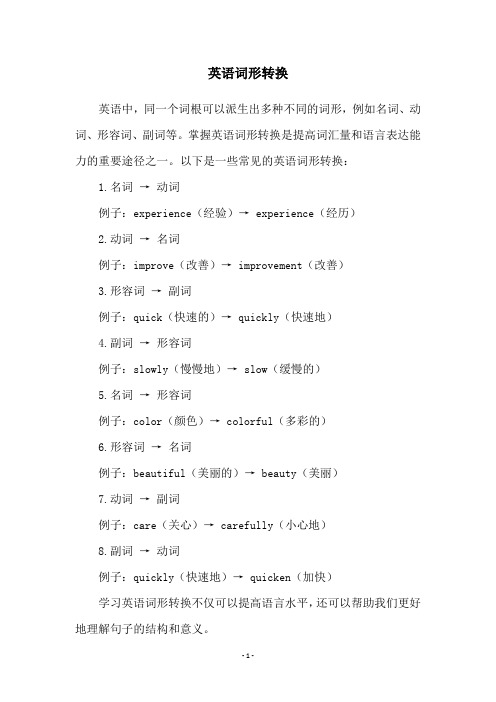
英语词形转换
英语中,同一个词根可以派生出多种不同的词形,例如名词、动词、形容词、副词等。
掌握英语词形转换是提高词汇量和语言表达能力的重要途径之一。
以下是一些常见的英语词形转换:
1.名词→动词
例子:experience(经验)→ experience(经历)
2.动词→名词
例子:improve(改善)→ improvement(改善)
3.形容词→副词
例子:quick(快速的)→ quickly(快速地)
4.副词→形容词
例子:slowly(慢慢地)→ slow(缓慢的)
5.名词→形容词
例子:color(颜色)→ colorful(多彩的)
6.形容词→名词
例子:beautiful(美丽的)→ beauty(美丽)
7.动词→副词
例子:care(关心)→ carefully(小心地)
8.副词→动词
例子:quickly(快速地)→ quicken(加快)
学习英语词形转换不仅可以提高语言水平,还可以帮助我们更好地理解句子的结构和意义。
常见词词形变化
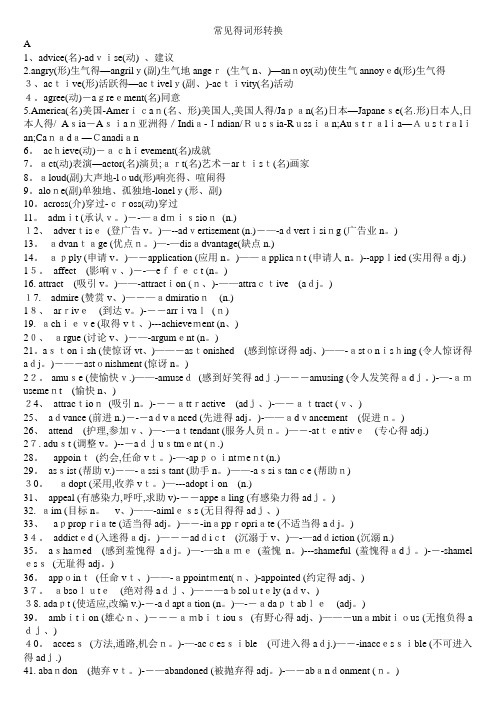
常见得词形转换A1、advice(名)-advise(动) 、建议2.angry(形)生气得—angrily(副)生气地anger(生气n、)—annoy(动)使生气annoyed(形)生气得3、active(形)活跃得—actively(副、)-activity(名)活动4。
agree(动)-agreement(名)同意5.America(名)美国-American(名、形)美国人,美国人得/Japan(名)日本—Japanese(名.形)日本人,日本人得/ Asia-Asian亚洲得/India-Indian/Russia-Russian;Australia—Australian;Canada—Canadian6。
achieve(动)-achievement(名)成就7。
act(动)表演—actor(名)演员;art(名)艺术-artist(名)画家8。
aloud(副)大声地-loud(形)响亮得、喧闹得9。
alone(副)单独地、孤独地-lonely(形、副)10。
across(介)穿过-cross(动)穿过11。
admit (承认v。
)--—admission(n.)12、advertise(登广告v。
)—--advertisement (n.)-—-advertising (广告业n。
)13。
advantage (优点n。
)—-—disadvantage(缺点n.)14。
apply (申请v。
)—-application (应用n。
)——applicant (申请人n。
)--applied (实用得adj.) 15。
affect(影响v、)--—effect (n。
)16. attract(吸引v。
)——-attraction (n、)-——attractive(adj。
)17.admire (赞赏v、)—-—admiration(n.)18、arrive(到达v。
)---arrival(n)19. achieve (取得vt、)---achievement (n、)20、argue (讨论v、)-—-argument (n。
英语词形变化

英语词形变化1. 时态变化- 动词根据时间线改变形式。
- Present: walk- Past: walked- Future: will walk2. 语态变化- 动词根据主语和动作的关系改变形式。
- Active: He eats the cake.- Passive: The cake is eaten by him.3. 数的变化- 名词和动词根据主语的数量改变形式。
- Singular: cat- Plural: cats4. 人称变化- 动词根据主语的人称改变形式。
- First person singular: I eat- Second person singular: You eat- Third person singular: He/She/It eats5. 性变化- 形容词和代词在某些情况下根据性别改变形式。
- Masculine: actor- Feminine: actress6. 格变化- 名词和代词根据它们在句子中的功能改变形式(这在现代英语中不如古英语中明显)。
- Nominative: He (subject)- Accusative: Him (object)7. 比较级和最高级- 形容词和副词根据比较的程度改变形式。
- Positive: happy- Comparative: happier- Superlative: happiest8. 名词所有格- 表示所有关系时,名词会改变形式。
- Singular: John's book- Plural: The children's books以下是一些具体的例子:- 动词变化:- Present Simple: She **eats** an apple.- Past Simple: She **ate** an apple.- Present Continuous: She is **eating** an apple.- Past Continuous: She was **eating** an apple.- Present Perfect: She has **eaten** an apple.- Past Perfect: She had **eaten** an apple.- 名词变化:- Singular: The **cat** is sleeping.- Plural: The **cats** are sleeping.- 形容词变化:- Positive: This is a **happy** dog.- Comparative: This dog is **happier** than that one.- Superlative: This is the **happiest** dog I've ever seen.。
词语词形总结

词语词形总结词语词形是指汉语词语在不同语法环境中的变化形式。
在语法分析和句法分析中,词语词形常被用来表示词语的不同形态,以便更好地理解和解释句子的结构和意思。
以下是对词语词形的总结,以便读者更好地理解和运用汉语。
一、名词的词形变化1. 单数形式(一):大部分名词在表示单数时,在词尾加上“-子”或“兀”。
例如:“书-书子”、“鸟-鸟兀”。
2. 单数形式(二):少数名词在表示单数时,改变词尾的音调。
例如:“手-把”、“果-种”。
3. 复数形式(一):大部分名词在表示复数时,在词尾加上“-们”或“侯”。
例如:“人-人们”、“日-百侯”。
4. 复数形式(二):少数名词在表示复数时,改变词尾的音调。
例如:“鱼-捆”、“兔-群”。
5. 名词的属格形式:大部分名词在表示属格时,在词尾加上“-的”。
例如:“老师-老师的”、“男孩-男孩的”。
二、动词的词形变化1. 动词的时态和语态:汉语动词没有时态和语态的直接变化,而是通过辅助动词和助词来表示。
例如:“吃”在过去时态变为“吃了”、“吃过”;在被动语态中变为“被吃”、“吃掉”。
2. 动词的体的变化:汉语动词分为实义动词和虚词。
实义动词有三种体:完全体、不完全体和手体。
例如:“走”在完全体中是“走”、“走了”,在不完全体中是“走着”,在手体中是“让…走”。
三、形容词和副词的词形变化1. 形容词和副词的比较级和最高级:形容词和副词在表示比较级和最高级时,一般在词尾加上“-er”和“-est”。
例如:“高-更高”、“快-最快”。
2. 形容词和副词的程度副词:形容词和副词的程度副词可以通过加上“很”、“更”、“最”等词语来表示。
例如:“高-很高”、“快-更快”、“快-最快”。
总结:词语词形是汉语中常见的语法现象,通过对名词、动词、形容词和副词的词形变化进行总结,我们可以更好地理解和运用汉语。
在实际应用中,我们需要注意不同语法环境下的词语词形变化,以便准确表达自己的意思。
通过不断学习和运用,我们可以提高对词语词形的理解和运用能力,进一步提升汉语的表达能力。
- 1、下载文档前请自行甄别文档内容的完整性,平台不提供额外的编辑、内容补充、找答案等附加服务。
- 2、"仅部分预览"的文档,不可在线预览部分如存在完整性等问题,可反馈申请退款(可完整预览的文档不适用该条件!)。
- 3、如文档侵犯您的权益,请联系客服反馈,我们会尽快为您处理(人工客服工作时间:9:00-18:30)。
常见的词形转换A1.advice(名)-advise(动) .建议2.angry(形)生气的-angrily(副)生气地anger (生气n.)-annoy(动)使生气annoyed(形)生气的3.active(形)活跃的-actively(副.)-activity(名)活动4.agree(动)-agreement(名)同意5.America(名)美国-American(名.形)美国人,美国人的/Japan(名)日本-Japanese(名.形)日本人,日本人的/ Asia-Asian亚洲的/India-Indian/Russia-Russian;Australia-Australian;Canada-Canadian6. achieve(动)-achievement(名)成就7.act(动)表演-actor(名)演员;art(名)艺术-artist(名)画家8.aloud(副)大声地-loud(形)响亮的、喧闹的9.alone(副)单独地、孤独地-lonely(形、副)10.across(介)穿过-cross(动)穿过11. admit (承认v.)---admission (n.)12. advertise (登广告v.)---advertisement (n.)---advertising (广告业n.)13. advantage (优点n.)---disadvantage(缺点n.)14. apply (申请v.)--application (应用n.)--applicant (申请人n.)--applied (实用的adj.)15. affect (影响v.)---effect (n.)16. attract (吸引v.)---attraction (n.)---attractive (adj.)17. admire (赞赏v.)---admiration (n.)18. arrive (到达v.)---arrival (n)19. achieve (取得vt.)---achievement (n.)20. argue (讨论v.)---argument (n.)21.astonish (使惊讶vt.)---astonished (感到惊讶的adj.)---astonishing (令人惊讶的adj.)---astonishment (惊讶n.)22. amuse (使愉快v.)---amused (感到好笑的adj.)---amusing (令人发笑的adj.)---amusement (愉快n.)24. attraction (吸引n.)---attractive (adj.)---attract (v.)25. advance (前进n.)---advanced (先进的adj.)---advancement (促进n.)26. attend (护理,参加v.)---attendant (服务人员n.)---attentive (专心的adj.)27. adust (调整v.)---adjustment (n.)28. appoint (约会,任命vt.)---appointment (n.)29. assist (帮助v.)---assistant (助手n.)---assistance (帮助n)30. adopt (采用,收养vt.)----adoption (n.)31. appeal (有感染力,呼吁,求助v)---appealing (有感染力的adj.)32. aim (目标n. v.)---aimless (无目的的adj.)33. appropriate (适当的adj.)---inappropriate (不适当的adj.)34. addicted (入迷的adj.)---addict (沉溺于v.)---addiction (沉溺n.)35. ashamed (感到羞愧的adj.)---shame (羞愧n.)---shameful (羞愧的adj.)---shameless (无耻的adj.)36. appoint (任命vt.)---appointment(n.)—appointed (约定的adj.)37. absolute (绝对的adj.)---absolutely (adv.)38. adapt (使适应,改编v.)---adaptation (n.)---adaptable (adj.)39. ambition (雄心n.)---ambitious (有野心的adj.)---unambitious (无抱负的adj.)40. access (方法,通路,机会n.)---accessible (可进入的adj.)---inaccessible (不可进入的adj.)41. abandon (抛弃vt.)---abandoned (被抛弃的adj.)---abandonment (n.)42. arrangement (安排n.)---arrange (vt.)41. apparent (显然的adj.)---apparently (adv.)42. accuracy (精确.)---accurate (精确的adj.)---accurately(adv.)---inaccuracy (错误n.)43. art (艺术n.)—artist ( 艺术家n.)44. appear (出现v.)—appearance (外貌n.)B1.bad(形)-badly(形/副.)2.beautiful(形)-beautifully(副)-beauty(名)美丽3.born(动)bear的过去分词-birth(名)出生4.breathe(动)-breath(名.)呼吸5. boring(形)无聊的,常用来修饰物或事-bored(形)常用来修饰人6. begin(动)-beginning (开始n.)7.build(动)建造-building(名)建筑物、楼房8.behave(动)举止-behavior(名)行为9.brave-bravely10. base (v.以…为根据)---basic (adj.)—basis11. benefit (好处n,有益于v)---beneficial (有益的adj.)---beneficially (adv.)12. believe (相信vt.)---believable (相信的adj.)---unbelievable (难以置信adj.)---belief (信仰n.)13. blood (血n.)---bleed (流血v.)---bloody (流血的adj.)14. breathe [brið] (呼吸v.)-breath [brɛθ] (呼吸n.)15. broadcast (v.)---broadcast---broadcastC1.child(单数)-children(复数)小孩1.care(动,名)关心-careful(形)细心的-carefully(副.)-careless(adj.)粗心的2.clear(形)-clearly(副.)清楚地3.chang(动)改变- -exchang(动)兑换; choose(动)选择-chance(名)机会4.crowd(动)-crowded(形.)拥挤的-uncrowed(形)不拥挤的5.color(名/动)-colorful(形)6.close(动.)-closed(形)关着的-close(形)亲密的,接近的municate(动)-communication(名)交际,交往8.collect(动)-collection(名)收集-collector(名)收藏者plete(adj.)-completely(adv.)10.clean(动)-cleaner(名)11.cloud(名)-cloudy(形)12.central(形)中心的-center(名)中心13.change(动)改变-exchange(动,名)交换、互换14. concern (使担心,涉及vt.)---concerning (关于prep)15. cruel (残忍的adj.)---cruelly (adv.)---cruelty (n.)16. compete (竞争v.)---competition (竞争n.)---competor (竞争者n.)---competitive (有竞争力的adj.)17. confuse (使困惑v.)---confusion (混乱n.)----confused (感到困惑的adj.)—confusing (令人困惑的adj.)18. content ( 满足的adj.)---contented (满足的adj.)---contentment (满意n.)19. curious (好奇的adj.)---curiously(adv.)---curiosity (n.)20. character (性格n.)---characteristics (特征n.)21. convenience (方便n.)---convenient (adj.) ---inconvenient (不方便的adj.)22. comfort (安慰,舒适n.v.)--comfortable(舒服的adj.)--uncomfortable (不舒适的adj.)23. classify (分类v.)---classification (n.)---classified (adj.)24. challenge (挑战v.)—challenging (具有挑战性的adj.)25. conduct(v.引导)—conductor (领导者n.)26. cover (封面n.覆盖v.) –discover(发现v.)—discovery (发现n. )27. confident (自信的adj.)—confidence (自信n.)D1.differ (不同v.)---different(形)-difference(名)不同的-differently(副)2.difficult(形)困难的-difficultly(副)-difficulty(名.)3.danger(名)危险-dangerous(形)4.die(动)-dead(形)-death(名)死5.discuss(动)-discussion(名)讨论6.decide(动)-decision(名)决定7.develop(动)-develoment(名)发展-developing发展中的-developed(形)发达的8.drive(动)-driver(名)司机9. determine (决定,决心vt.)---determination (n.)---determined (adj.)10. destroy (破坏vt.)---destruction (n.)---destructive (adj.)11. devote (献身v.)---devotion (奉献n.)—devoted (忠心的adj.)—devote…to..12. doubt (怀疑n,v)---doubtful (感到怀疑的adj.)13. distant (遥远的adj.)---distance(距离n.)14. direct (直接的adj.)---directly (adv.)---direction(方向n.)15. delight (乐事n. 使…高兴vt.)---delighted (高兴的adj.)---delightful (令人高兴的adj.)16. dark (黑暗的adj.)---darken (v.)---darkness(n.)17. disppointed (失望的adj.)---disppoint (使失望v.)---disppointing (令人失望的adj.)---disppointment (n.)18. disability ( 伤残n.)---disable (使丧失能力v.)---disabled (伤残的adj.)---ability (能力n.)---enable (使能够vt.)19. depth (深度n)—deep (adj.)—deeply (adv.)---deepen (加深v.)20. donate (捐赠vt.)---donation (n.)---donator (捐赠者n.)21. distribute (分发,分配vt.)---distribution (n.)---distributive (分布的adj.)22. disturbing (令人不安的adj.)---disturbed (不安的adj.)---disturb (打扰v.)---disturbance (骚乱n.)23. disappear (消失v)—disappearance (消失n)24. decorate (装饰v.)-decorator (装饰者n.)—decoration (装饰n.)E1.enjoy(动)热衷于-enjoyable(形)令人愉快的-enjoyment(名.)2.east(名)-eastern(动)东方的/ west(名)-western(形)西方的/south(名)-southern(形)南方的/ north(名)-northern(形)北方的/3.excite(动.)-exciting(形)兴奋的-excited(形.)令人兴奋的4.expensive(形)昂贵的-inexpensive(形)便宜的5.exam(名)-examination(名)考试(两个同义)cate(动).教育-education(名)educational(形)有教育意义的7.special(形.)特殊的-especially(副)特别、尤其8.easy(形.)-easily(副.)容易地9. express (表达v.)---expression (表情n.)10. equal (平等v.)---equally (adv.)---equality (n.)—equality (n.)11. ending (结局n.)---end (结束v.)---endless (永无休止adj.)12. equip (装备v.)---equipment (设备n.)---equipped (装备好的adj.)13. entertain (使欢乐v.)---entertaining (愉快的adj.)---entertainment (娱乐n.)14. eager (热切的adj.)---eagerly (adv.)---eagerness(渴望n.)15. evident (明显的adj.)---evidence (证据n.)16. effect (结果,效力n.)---effective (有效的adj.)---affect (影响v.)8. independence (独立n.)---independent (adj.)---depend (依赖v.)---dependent (adj.)9. impress (印象深刻vt.)---impression (印象n.)---impressive (给人以深刻印象的adj.)---impressed (被打动的adj.)10. instruct (命令,指示vt.)---instructive (adj.)---instruction (n.)11. interrupt (打断v.)----interruption (中止n.)12. inspect [ɪn'spɛkt] (检查v)-inspector (检查者n)J1.Judge(判断v.)---judgement(n.)2. joural (游记n.)-jouralist (新闻工作者n.)K1.knowledge(名)知识_knowledgeable(形)知识渊博的2. kind (好心的adj.)-kindness ( 好心n.)L1.luck(名)-lucky(形.)幸运的-luckily(副)-unlucky(形.)不幸运的-unluckily(副.)2.lose(动.)丢失-lost(形.)—loss (n.)3.love(动)爱-lovely(形.)可爱的-loving(形)慈爱的4.live(动居住-lively(形)有活力的-alive(形)活着的、在世的life (生命n.)—lifetime (一生n.)—living (活着的adj.)5.learn(动)-learner(名)学习者6.loud(形)响亮的-loudly(副)-aloud(副)w(名)法律-lawyer(名)律师8.lead(动)引导-leader(名)领导9. limit (限制vt.n)---limited (有限的adj.)---limiting (限制的adj.)10. library (图书馆n.)-librarian (图书管理员n.)M1.marry(动)结婚,非持续性动词,不能跟一段时间连用-married(形.)已婚的2.music(名.)-musicial(adj.)美妙的,音乐的-musician(名)音乐家3.manage(动)安排-management(名)管理-manager(名)经理4.mamy/much-more(比较级)-most(最高级)5.meet(动)见面-meeting(名)会议6.mean(动)-meaning(名)意思7.medicine(名)药-medical(形)医学的8. majority (大多数n.)---major (主修的adj.主修v.)9. miss ( 错过v.)—missing ( 丢失的adj.)N1.neccessary(形.)必要的-necessarily(副)2. near(形./介)很近的-nearly(adv.)几乎-nearby附近3.neighbour(名)邻居-neighbo(u)rhood(名)邻近地区4.noise(名)噪音-noisy(形)嘈杂的noisily (吵闹地adv.)5.natural(形)自然的-nature(名)自然界O1.office(名)办公室-officer(名)军官,公务员2.own(动)-owner(拥有者,主人)anize(动)组织-organized(形)有组织的-organization(名)组织4. observe ( 观察v.)---observation (n.)5. optimistic (乐观主义的adj.)---optimist (乐观主义者n.)---optimism (乐观n.)6. occupy (占用vt.)---occupied (没空闲的adj.)---occupation (占用,职业n.)7. origin (n.)---original (adj.)---originally (adv.)P1.polite(形.)礼貌的-politely(副)-impolite(形.)不礼貌的-impolitely(副)2.pollute(动.)污染-pollution(名)3.please(动)期望,愿意-pleased(形.)欣喜的,满足的,be pleased with4.pleasure(名)快乐-pleasant(形.)愉快的-unpleasant(形)-pleased(形)高兴的5.produce(动.)-product(名.)生产品-production(名) 制造6.pronounce(动)发音-pronunciation(名)7.practice(动./名.)练习-pratise(动.)8.possible(形.)可能的-possibly(副)-impossible(形)不可能的-impossibly(副)9.person(名.)-personal(形)个人的—personality (人格,个性n.)—personally (adv.)10.poor(形)-weak(形)差的,弱的11.play(动)-player(名)运动员12.popular(形)受欢迎的-popularity(名)13.piano(名)钢琴-pianist(名)钢琴家14.profession(名)专业-professional(形)专业的15.predict(动)预测-prediction(名)预测16.peace(名)和平-peaceful(形)宁静的,和平的17. perform (表演v.)---performance (n.)18. patient (耐心的adj.)---patience (n.)---imptient (没有耐性adj.)19. presence (出席n.)---present (出席的,目前的adj.)20. preserve (保护区n.保存v.) ---preservation (n.)21. puzzle (使…困惑v.难题n.)---puzzled (感到困惑的adj.)---puzzling (令人困惑的adj.)22. press (按,压v.)---pressing (紧急的adj.)---pressure(压力n.)23. poison (毒药n.)---poisonous (有毒的adj.)24. possess (拥有vt.)---possession (n.)---possessive (adj.)25. participate (参加v.)---participant (参加者n.)---participation (参加n.)26. pride (以..为自豪v.)—proud (自豪的adj.)27. pain (疼,痛苦n)—painful (痛苦的adj.)Q1.quick(形.)快的-quickly(副.)2.quiet(形.)安静的-quietly(副)注意区别quite(副)十分,相当3. qualification (资格n.)---qualify (取得资格v.)---qualified (合格的adj.)---quality (品质,质量n.)R1.relax(动.)-relaxed(形.)放松的-relaxing(形)轻松的2.report(动/名.)报道-reporter(名)记者3.rain(动/名.)-rainy(形.)有雨的;sun(名)-sunny(形.)晴朗的;wind(名.)-windy(形)有风的;cloud(名.)-cloudy(形)多云的;snow(动./名.)-snowy(形)下雪的,有雪的4.read(动.)-reader(名)读者;write(动.)-writer(名)作者; run(动.)-runner(名)奔跑者;play(动)-player(名);cook(动.)-cooker(名);drive(动.)-driver(名);lead(动)-leader(名.)learn(动)-learner(名)/sp eak(动)-speaker(名)5. visit(动)-visitor(名.)参观者; translate(动)-translator(名)-translation翻译;act(动)表演-actor(名)演员-action(名)动作6.real(形)真实的-really(副)事实上7.recent(形)最近的-recently(副)最近地8.Russia(名)-Russian(形)9. responsibility (责任n.)---responsible (adj.)10. relief (减轻n.)—relieve (v.)11. reaction (反应n.)---react (v.)12. respect (尊重v. n.)---respectable (值得尊敬的adj.)----respectful (恭敬的adj.)13. regret (后悔n.v.)---regretful (后悔的adj.)----regretless (无悔的adj.)14. refresh (使恢复vt.)—refreshing (使人振作的adj.)—refreshed (振作的adj.)---refreshment (恢复n.)15. remark (谈论,言论n.v.)---remarkable (值得注意的,显著的adj.)---remarkably (adv.)16. review (复习v.)-revision (复习n.)S1.safety(名)安全-safe(形.)-safely(副)2.science(名)-scientist(形)科学家3.speak(动.)-spoken(形.)-speaking(动名词)-speech(名)演说4. several=a few=some5.salt(名)-salty(形.)盐的6.slow(形)慢慢的-slowly(副.)7.sun(名)-sunny(形)-sunshine(名.)-sunless()阳光8.surprise(动./名.)吃惊-surprising(形.)惊讶的,如:surprising news常用来修饰物-surprised(adj.)感到惊讶的;常用来修饰人;如:I am surprised at you.9.sleep(动)-asleep(形)睡着的-sleepy(形)困倦的,想睡的10.serious(形)严重的、严肃的-seriously(副)严肃地11.strange(形.)奇怪的-stranger(名.)陌生人12.succeed(动.)成功-success(名)-successful(形)-successfully(副)-unsuccessful不成功的13.sudden(形.)-suddenly(副.)突然14.she(主格)-her(宾格)-her(形容词性)-hers(名词性)15.snow(名)-snowy(形)下雪的,有雪的16.sing(动)唱歌-singer(名)歌唱家-song(名)歌曲17. settle (定居vt.)---settlement (定居n.)18. suffer (遭受,痛苦v.)---(痛苦n.)19. similar (相似的adj.)---similarity(n.类似)20. shock (使震惊v.)---shocking (adj.)---shocked (adj.)21. solve (解决v.)---solution (n.)22. simple (adj.)---simplify (简化vt.)—simply (简单地adv.)23. sense ( 感觉n.)—sensible (明智的adj.)—sensitive (敏感的adj.)24. starve (饿死v.)---starving (饥饿的adj.)---starvation (饥饿n.)25. sad (悲伤adj.)—sadly (adv.)---sadness(n.)26. strengthe (强项n.)---strenghten (加强vt.) ---strong (强壮的adj.)27. surround (包围v)---surrounding (周围的adj.)---surroundings (环境n.)28. spoken (口语的adj.)--speak (v.)--speech (演讲n.)---speechless (说不出话的adj.)29. strong (adj.)---strength (力气n.)---strengthen (加强v.)30. stress (v.n.)---stressful (产生压力的adj.)---stressed (感到有压力的adj.)31. state (陈述vt.国家,状态n.)---statement (陈述n.)32. satisfaction (满足n.)--satisfy (使满意vt.)--satisfatory (令人满意的adj.) --satisfied(满意的adj.)----satisfying (令人满意的adj.)33. sympathy (同情n.)—sympathetic (同情的adj.)—sympathize (同情v.)34. socialist (社会主义者n.)---social (社会的adj.)---socialism (社会主义n.)---society (社会n)35. sharp (锋利的adj.)----sharply (急剧地adv.)---sharpness(锐利n.)---sharpen (尖锐v.)---sharpener (削刀n.)36. skill (技巧,熟练n)---skillful(灵巧的adj.)---skillfully(巧妙地adv.)---skilled (有能力的,熟练的adj.)37. surf (冲浪v.) -surfing (冲浪n.)38. suggest (v.)---suggested (adj.)—suggesting (adj.)---suggestion (n.)T1.thank(动)-thankful(形.)感激的2.true(形)-truly(副)-truth(名)真相3. toothache(s)牙痛/headache(s)头痛;have a headache/have(catch) a cold4.travel(动)-travel(l)er(名).游客/tour(动)旅游,观光-tourist(名)旅行者5、they(主格)them(宾格)their(形容词性)theirs(名词性)6.teach(动)-teacher(名)7.tired(形)累的,疲倦的,常用修饰人-tiring(形)累人的,常用修饰物或事8.terrible(形)可怕的-9. terrify (使惊吓v.)---terrified (受惊吓的adj.)---terrifying(令人恐惧的adj.)10. teach(v.教)—teacher(老师n.)11. tour (旅游n.)-tourist (旅游者n.)12. turn (转v.)—turning( 转折点n.)Ue(动)-useful(形)有用的-usefully(副)-used(adj.)用过的,二手的---useless (adj.无用的)ual(形)平常的-usually(副)-unusual(形)不平常的unusually(副)3. unlike (不像prep.)--like (像prep,喜欢v)--likely (可能的adj.)--dislike (不喜欢v.)4. urge (催促vt.)---urgent (急迫的adj.)---urgency (催促n.)V1.visit(动)-visitor(名)2.violin(名)小提琴-violinist(名)小提琴手(家)3. value (价值n. v.)—valuable (贵重的adj.)---valueless (无价的adj.)4. violent (猛烈的adj.)---violence (暴力n.)---violently (adv.)5. various (各种各样的adj.)---vary (改变v.)---variety (变化n.)6. voluntary (自愿的adj.)---voluntee (自愿,自愿者n/v)----voluntarily (adv.)W1.worry(动)-worried(形)2.win(动)-winner(名)获胜者3.we(主格)-us(宾格)-our(形容词性)-ours(名词性)3.wonder(动.)-wonderful(形)精彩的-wonderfully(副)4.wind(名)-windy(形)5.wait(动)-waiter(名)服务员6.with(介)有、跟-without(介)无、没有7.wake(动)睡醒-awake(形)醒着的8. will (愿意,将v.)---willing (乐意的adj.)---willingness (乐意n.)---unwilling (adj.)9. worth (价值n, 值得的adj.)--- worthy (应值得的adj.)---worthless (没有用的adj.)---worthwhile (值得的adj.)10. work (工作v.)—worker(工人n.)11. wake (醒来v)—awake(醒着的adj.)Y1,you(主格)-you(宾格)-your(形容词性)-yours(名词性)注意一些相近词的区别:draw画画(动),drawer(名)抽屉//show(动)展览,shower(名)沐浴//short(形)短的,矮的shorts(名)短袜//new(形)新的,news(名)新闻//weather天气,whether是//band乐队,bank银行//watch(动)观看,(名)手表//beside在……旁边,besides除……之外//except(介)把……除外-expect(动)期待//again()再-against(介)反对//clearly(副)清楚地,nearly(副)几乎//quiet(形)安静的,quite(副)相当//hand out分发,hang out闲逛//thirty(数)三十,thirsty(形)口渴的//bench(名)长椅,beach(名)沙滩//though(连词)虽然,thought是think//think(动)想,thank(动)谢谢//fit(动)适合,fat(形)肥胖的//bother(动)打扰-brother(名)兄弟//experience(动)经历-experiment(动)试验//form(动)构成-from(介)从……//miss(动)错过,思念-kiss(动)吻//miss(动)错过-mess(名)混乱//farther(形)更远的-father(名)父亲英语单词在词形转换时,呈现出许多有规则的变化。
